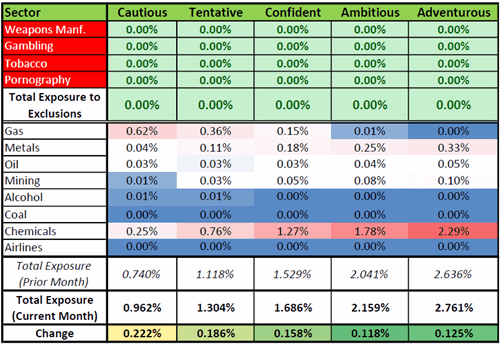If you’d like to receive a notification of when we launch our Sustainable Investments, please join our waiting list here.
Investing is often seen as a way to make money, but it can be about so much more. Not only can it drive positive change in society, it can also help protect the environment – it all depends on how you invest. Here’s a quick guide to ethical and sustainable investing.
What is ethical investing?
Ethical investing is about excluding investments that go against your values. In other words, if you’re investing ethically, you’re typically and purposefully avoiding certain companies or sectors either because they’re deemed harmful or simply do not match your principle. The focus here is on what we call ‘negative screening’, where all the ‘bad stuff’ is filtered out. By ‘bad stuff’ we mean anything from tobacco and weapons to fast fashion and gambling - this very much depends on your own values. And the thing with ethical values is that there is no societal consensus about exactly what is good or bad, so it is very much up to you to decide what controversial activities you want to exclude from your investments.
If you’re investing on your own, then you’ll be in control of what goes in your investment plan, however, researching and picking companies can be time-consuming and requires a lot of work. If you’re too busy to choose your investments individually, you could use ethical funds – think of them as hampers full of ethical investments that were selected by experts following certain criteria. Most ethical funds will perform negative screenings and remove harmful activities. One thing to note is that exclusion policies will vary between funds, with some companies and industries fully screened out, and others assessed on a case-by-case basis.
What is sustainable investing?
Sustainable investing is a broad approach to ethical investing. Put very simply, this investment practice is about excluding harmful activities and seeking companies that do good. Sustainable investing focuses on organisations that can demonstrate great practices and policies in terms of their environmental impact, their social responsibility, and the quality of their internal governance mechanisms. In practice, investment professionals will look at a large range of ESG criteria – here ESG stands for ‘Environmental, Social, and Governance.’ They’ll check things like how much water waste a company produces, how diverse its workforce is, and how transparent it is when reporting to the public. Then, each company will be given a score – the better a company’s ethical standards are, the higher their ESG rating will be.
Now, the selection doesn’t stop there as sustainable investing also focuses on the output and impact of companies. This means companies involved in potentially controversial sectors, could be seen as a good sustainable investment if they’re able to show that they’re taking the necessary steps to improve their activities and therefore improving their impact on society and the environment.
This sustainable approach is particularly used in ‘thematic investments’ which focuses on a specific area. For example, a ‘gender equality’ thematic investment will look to invest in companies that are striving to have a more diverse and representative workforce.
The Wealthify ethical approach
So, what approach do we use at Wealthify? Well, we mainly use ethical as most funds we include in our Plans aim to exclude harmful activities, including, but not limited to, the so-called ‘sin stocks, (gambling, tobacco, adult entertainment, and weapons). Here’s what’s excluded and limited in our Ethical Plans:

We do take the ethical approach a bit further by also including funds that are actively seeking companies committed to have a positive impact on society and the environment. The funds we use are actively managed, which means companies are constantly monitored and can be removed if they let their ethical standards slip. We also have our own audit and due diligence processes to ensure your money continues to be invested in what our fund selection process deems the best ethical funds.
The other benefit of using active ethical funds is that they also consider companies that are working hard to improve their ESG score. With passive ethical funds, you don’t always get this flexibility as they often to analyse funds with a more rigid ESG scoring system which completely ignores companies that are trying to make their activities more ethical.
What’s more, with active funds, there’s a greater opportunity for change. If fund managers hold enough shares in a company, they can use their shareholder voting power to try and influence the overall direction of the business and push for more ethical measures - there’s typically no such option with passive funds. Now since active ethical funds do involve a bit more work, they tend to cost a little more, but at Wealthify, we believe it is the only way to build Plans that are truly ethical.
Why we aren’t moving to sustainable from ethical (yet)
As things currently stand, our ethical funds aren’t fully excluding fossil fuels, although many of our managers limit their exposure to them. This is the key distinction that keeps us outside the sustainable investing area. Why are you not removing fossil fuels from your Plans, you ask? Our concern here is that the range of funds that are genuinely mandated to exclude fossil fuels and meet our other exclusion and investing criteria is simply too small. As a condition of us investing we require our fund managers to send us their individual holdings so that we can run our own algorithmic check. Once you introduce our exclusions, such as active funds and sin stocks, and then add an exclusion for fossil fuels, you’ll find yourself with a very limited number of funds – only about ten at the moment, three of which are UK only and seven of which are globally focused. Needless to say, this won’t allow us to match our geographical exposures, which is a core tenet of our investment process which relies heavily on diversification, where your investments are spread across investment types and regions.
However, this isn’t never, it is not yet! We are actively engaging fund managers to find suitable options and we are ready to change and move to sustainable once the tools are available. But we believe in making this change and it is important that the funds available both offer the depth and range we expect from our ethical funds, as well as the high level of due diligence and transparency.
Past performance is not a reliable indicator of future results.
Please remember the value of your investments can go down as well as up, and you could get back less than invested.



